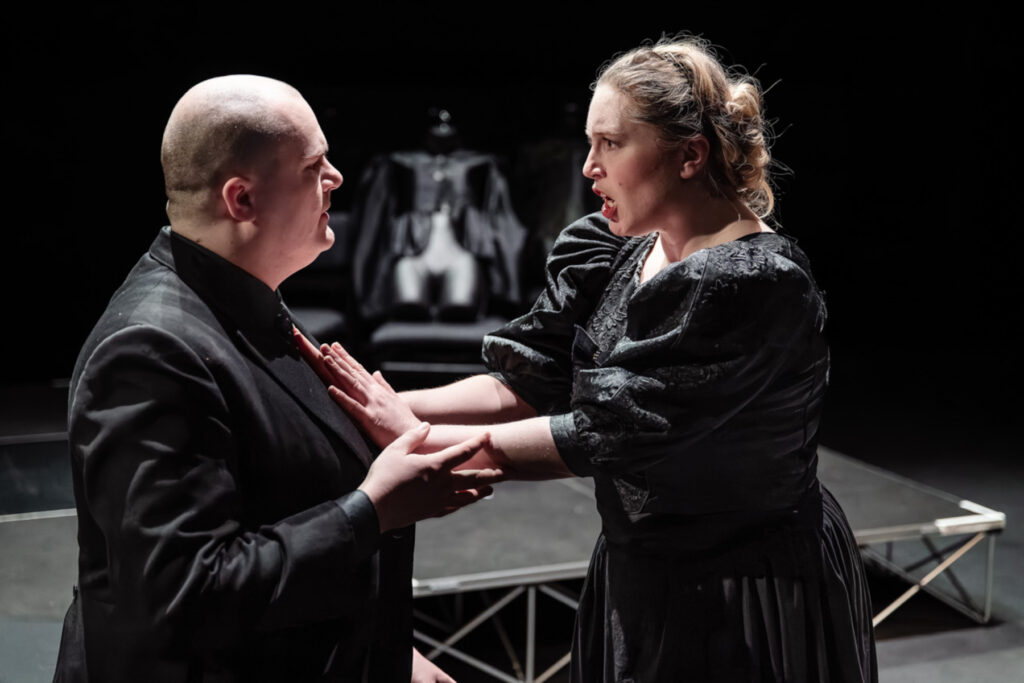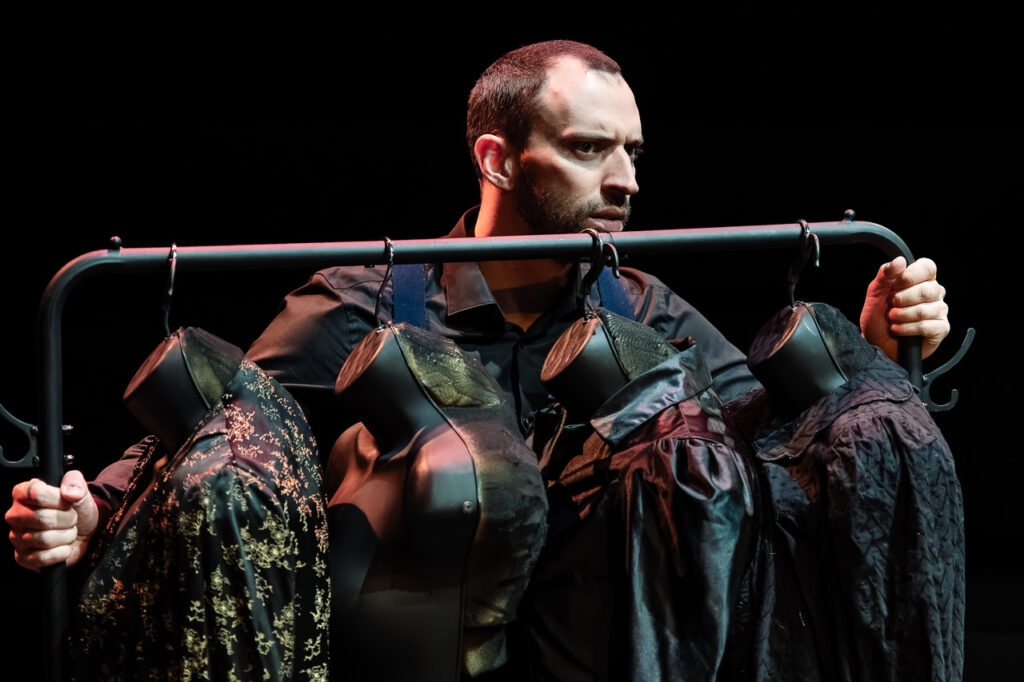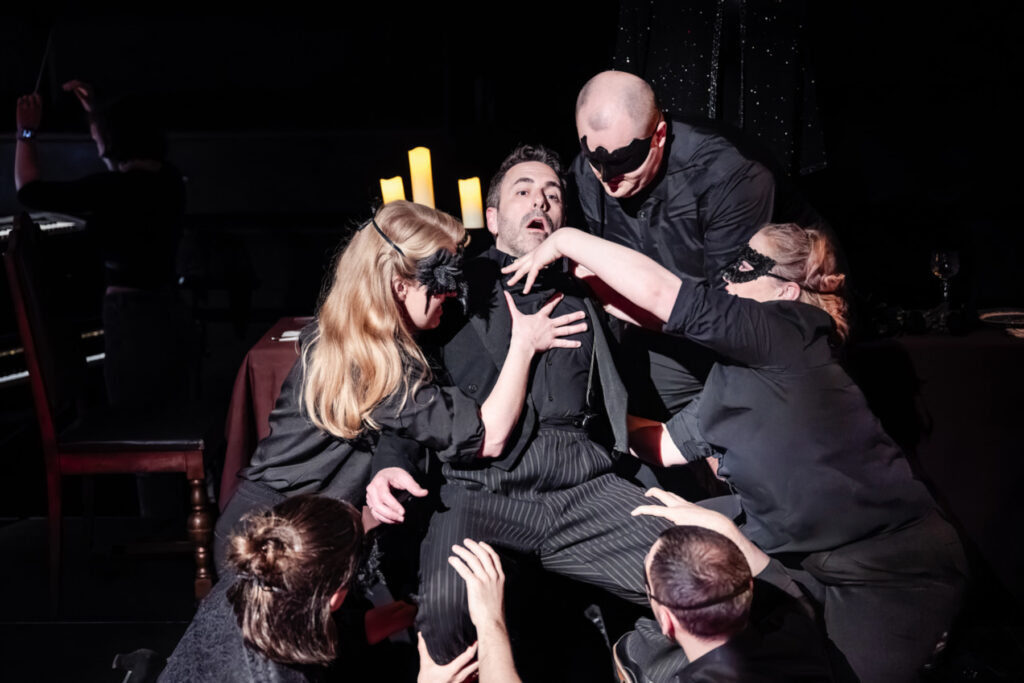There’s a deconstructed vibe to Arcola Theatre’s Studio 1 – raw brick, concrete, wood and metal predominate – and, in answer to this, Marcio da Silva’s production of Don Giovanni for Ensemble OrQuesta’s latest of their cut-down Mozart operas opted for minimal set, largely white lighting, and monochrome costumes, leaving the heavy lifting of the opera’s shifting emotions to music and acting. No bad thing, one might say, and this was largely successful. The challenges here, though, are obvious. Both cast and Hastings Philharmonic Orchestra Ensemble – a string quartet with double bass, flute, clarinet, bassoon (and piano for recitatives) – were practically in the audience’s laps, and every note and move unfiltered by the airbrush of distance or a more resonant acoustic. With one instrument to a part, and the audience on three sides, absolute accuracy was paramount, and achieving balance and blend (particularly between instruments and voices) wasn’t always easy. Those of us sitting closer to the orchestra occasionally found it a little too prominent, and were aware of the (admittedly few) slips in instrumental intonation. By and large, though, the orchestral sound was slick and elegantly delivered under the sensitive direction of Marcio da Silva.

Although the costumes and set, on the face of it, were minimalist black with white touches, there were, nonetheless, subtle hints of class: the two Donnas wore more ornate skirts and blouses, while Zerlina’s outfit suggested an off-the-peg wardrobe; the three male aristos were distinguished by their tailcoats, contrasting with the braces-over-shirts of Leporello and Masetto. An ingenious stage device was to use the upper halves of female shop mannequins, dressed in a variety of sparkly black tops (with occasional ‘wardrobe malfunctions’), to suggest Don Giovanni’s many conquests, and these all appeared, hung on clothes rails, at his Act 1 ball (the ‘irrelevant’ male attendees reduced to jackets on coat hangers). The cuts to the work to make it a more manageable production were sensitively done, and, one must applaud da Silva for losing the epilogue, which, while Mozart makes the most of its musical possibilities, is still da Ponte stating the obvious in a deeply prosaic and po-faced way.
Oshri Segev (singing the eponymous anti-hero) made for a believable sex-pest, his athleticism, wandering hands and temper tantrums marking him instantly as toxic; missing, perhaps (apart from the saturnine good looks) was Giovanni’s slippery charm that’s essential for the character’s believability. His voice, though, was just right for the part: a baritone with enough heft and edge to suggest menace and to enunciate patter (Finch’han dal vino, for example), yet with a clear, silken quality that combined blend and distinctiveness in the ensemble pieces – notably in the initial all-male trio with Leporello and Il Commendatore – and a convincingly seductive tone for Là ci darem la mano.

Of the other male principals, Jay Rockwell’s Masetto and John Twitchen’s Don Ottavio made the strongest impression. Rockwell’s sturdy baritone served him well for his largely blustering role, and Twitchen’s pure, bright tenor helped portray the somewhat priggish nobleman (blending especially well in the Protegga il giusto cielo trio), albeit that his vocal production in Dalla sua pace sounded a little tight at times. Flávio Lauria’s comic timing for Leporello was hugely enjoyable, but, sadly, his voice lacks the solidity and projection that complement the role, and the vocally comedic possibilities of the catalogue aria were somewhat missed. Vedat Dalgiran’s basso profundo portrayed a suitably unrelenting Commendatore with force and precision, albeit that it thinned a little at the top of his range.
The three female principals were chosen well for contrast. Helen May (Donna Elvira) has a splendidly bright tone to her voice, the modulated sweetness of which brought us a moving Ah, chi mi dice mai, but to which she was able to add steel for her more unhinged material. Rosemary Carlton-Willis (Donna Anna) has a more spread tone, but she deployed the prickly edginess of it well for her spats with Don Ottavio, and for the grief and horror of Fuggi, crudele, fuggi! Anna-Luise Wagner’s Zerlina squared the difference, her warm soprano portraying perfectly the character’s paradoxical mix of innocence and cunning.

While the various arias were enjoyable, the best of the singing was in the ensemble work. The recitative passages between characters were timed perfectly to present credible conversations, and the duets, trios, etc. (particularly the sextet at the close of Act 1) were beautifully blended.
Barry Creasy
Don Giovanni
Music composed by Wolfgang Amadeus Mozart (adapted by Marcio da Silva)
Libretto by Lorenzo Da Ponte
Cast and production staff:
Don Giovanni – Oshri Segev; Leporello – Flávio Lauria; Donna Elvira – Helen May; Donna Anna – Rosemary Carlton-Willis; Zerlina – Anna-Luise Wagner; Don Ottavio – John Twitchen; Masetto – Jay Rockwell; Il Commendatore – Vedat Dalgiran; Puppeteer – Orlando Bishop; Actress – Marjorie Lemos
Stage/Music Director – Marcio da Silva (also playing Don Giovanni on two nights); Conductor – Marcio da Silva (also Andreas Levisianos and Beth Fitzpatrick on other nights); Costumes – Gill Jenks; Puppets – Orlando Bishop.
Hastings Philharmonic Orchestra Ensemble: Violins – Izabela Stocka, Sara Matović; Viola – Zami Jalil; Cello – Nikolai Ginov; Double Bass – Tom Mahoney; Flute – Nevena Atanasova; Clarinet – Boyan Ivanov/Fresca David; Bassoon – Keane Kei Yin Lui
Arcola Theatre, London, 30 August 2025
All photos © Julian Guidera